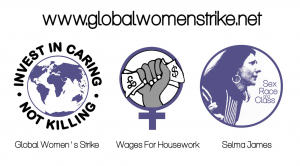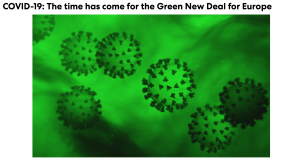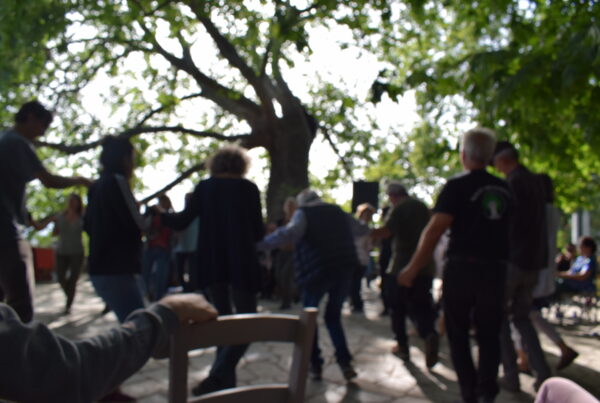By Stefania Barca
In times of COVID-19 pandemic, the international anti-capitalist feminist movement is working to redefine the terrain of struggle towards more inclusive and structurally transformative responses to the quarantine regime: the Care Income proposal and its articulation within the Green New Deal for Europe.
One of the effects of the Covid19 pandemic that has received the most media and political attention is that of the economic fallout – in particular of the quarantine regime. This has led to governmental proposals (for example, the ‘Cura Italia’ decree) and non-governmental (demands for a ‘quarantine income’, and/or universal basic income) which confront each other in the public sphere, shaping the field of possibilities and social and political struggle. In the meantime, however, the international anti-capitalist feminist movement is working to redefine the terrain of struggle in a direction that allows for more inclusive and structurally transformative responses. This has resulted in the proposal to establish a Care Income – just launched through an international webinar and an open letter to the governments of all countries. This intervention summarizes the key points of the Care Income proposal, and its articulation within the Green New Deal for Europe, with the aim of opening a debate on the strategic usefulness of these proposals in the current political situation.

Source: https://twitter.com/womenstrike
The international Care Income campaign
The proposal consists in recognizing unpaid care work (or poorly paid and without rights), mainly attributed to women and marginalized subjects, as a necessary and ineliminable social function, but at the same time invisible and ignored by anti-crisis measures – even when the pandemic and quarantine result in an unprecedented burden on such work. The letter notes that Covid19 has added to all the invisible pandemics (poverty, war, domestic violence, austerity) that have been affecting the most vulnerable sectors of the population for decades – including single-parent families, sick, disabled and elderly people. It is known that the pandemic is weakening our ability to resist and survive physically and financially: from immune systems already compromised by poverty, discrimination, pollution, war, occupation, displacement and other forms of violence, to inadequate health care and income, especially in the global South, in the racialized communities of the North and among refugees from all over the world.
In response to the virus, the document continues, workplaces, schools and transportation have been closed – and proposals to replace lost wages are being discussed. These drastic measures show that governments can act quickly and find money to deal with “emergencies”, if so they wish. In this critical moment, therefore, it becomes essential to organize and fight to collectively redefine what we need.
The Care Income campaign is promoted by the transnational movement Global Women Strike (GWS). It inherits the Wages for Housework campaign of the early 1970s, which profoundly marked the international feminist movement, and merged into the feminist 8thof March strike. One of the key demands of the GWS is to drastically reduce military spending, by allocating at least 10% of the resources thus obtained to social services and support for care work – not only through wages but also through the provision of free public services. Among these, a central place occupies the support to victims of domestic violence, and its prevention through economic support of women’s independence – guidelines also adopted in Italy by the Non Una Di Meno movement.
In the 1980s, the Women Count – Count Women’s Work petition voiced a mass movement to recognize this work; signed by 1,200 organizations representing millions of women around the world, it obtained a United Nations resolution (in 1995) which called on governments to measure and value unpaid work in GDP reports. Although the value of this work has been estimated at 10.8 trillion dollars, no market or policy mechanism guarantees that this value is systematically translated into income for women and those who carry out unpaid care work. It has become absolutely necessary instead, continues the letter, to support the care providers through an income that recognizes their public function and helps them to carry it out in the best possible way.
In Europe, the letter concludes, this request is now incorporated into a new political-economic proposal, the Green New Deal for Europe, which makes it a cornerstone of its climate justice program. GNDE, in fact, provides for the establishment of an income for all those who take care of people, the urban and rural environment, and the natural world. Finally, the protection of people and the protection of the Earth can be equated and prioritized over a market that does not take charge of it.

Source: https://www.gndforeurope.com/covid
Another Green New Deal is possible – and it’s feminist.
In early January of this year, the European Commission approved the Green Deal, an investment plan to reduce climate-changing emissions. Developed in response to recent US DEM initiatives, and in particular to the Green New Deal launched by MEP Alexandria Ocasio Cortez with the support of Bernie Sanders, and to the intensification of climate protests worldwide, the Commission’s plan adopts a neoliberal approach to the climate crisis, which consists in a green growth perspective bounded by fiscal rigor policies that do not allow for the expansion of public expenditure. The plan is therefore based on the perverse logic of trickle-down: only if the market economy grows do funds become available to compensate for the damage caused by it, including climate change, inequalities and falling employment.
This, however, is not the only plan available. In the same months in which the GD was in preparation, a network of researchers, intellectuals and activists from all over Europe – urged by the Diem 25 movement – was committing to the compilation of an alternative plan, to be included in the context of a large campaign of mobilization for the democratization of the European economy and anti-crisis policies. The result was the Green New Deal for Europe (GNDE), centered on a document entitled A Blueprint for Europe’s Just Transition. The difference is radical. GNDE is based on redistributive public finance criteria that give priority to the fight against inequalities and environmental injustice and to economic democracy, with a view to post-growth. While that of the Commission is a top-down program, addressed to the governments of EU countries to adopt market incentives for the benefit of businesses, GNDE is a political platform, a strategic project aimed at urging broad mobilizations from below.
GNDE represents a historic opportunity for an eco/feminist economic revolution. To ensure an equitable transition to a ‘post-carbon’ economy, the plan aims to move the focus of collective income and welfare creation from industrial production to social and environmental reproduction, i.e. the maintenance, recycling, repair and restoration of environmental, infrastructural and social resources, in short, to the work of care – both for people and for the environment. In this spirit of structural articulation between social reproduction and ecological reproduction, GNDE proposes to establish a Care Income to be made available for all those who are engaged in the unpaid care of people and/or urban and rural environments (through organized defense against extractivism and degradation, but also through the rehabilitation and care for common areas, soil, water, forests, biodiversity), both in the home and in the community and ecosystem.
A proposal like this, of restructuring the economy based on eco-feminist principles, evidently does not come out of nowhere; it incorporates decades of feminist and environmental justice struggle, activism, and research. The concept of Care Income is in fact the result of a collaboration born within the group of contributors of the aforementioned document A Blueprint for Europe’s Just Transition, in particular between Selma James and Nina López (GWS), Giacomo D’Alisa ( Research & Degrowth) and myself. It gives expression to an extended, or socio-ecological, concept of ‘care’, resulting from the intertwining of feminist political economy, eco-feminism (through the concept of Earthcare – care of the earth) and degrowth perspectives.
The GNDE campaign, which incorporates the Care Income within a vast European financial and productive reconstruction program, constitutes a historic opportunity and a resource of enormous importance for developing a feminist policy capable of meeting the climate challenge of our time. However, the campaign does not prescribe in detail the methods for attributing Care Income: the latter will have to be elaborated independently by each movement and political entity that wants to make it their own, based on specific needs and conditions. More than a complete program of policies, GNDE is proposed as a platform for struggle open to the contribution of all those movements that share its guidelines, in the spirit of democratization and decentralization of European economic and climate policies through the participation of a variety of collective subjects fighting for environmental justice. The latter, as is now well-known, is based on the principle that the ecological crisis is rooted in the profound social and global inequalities generated by the capitalist, colonial and patriarchal model. This basic principle allows today – perhaps for the first time in decades – to think of a feminism that is truly the cornerstone of radical social change.







9 Comments